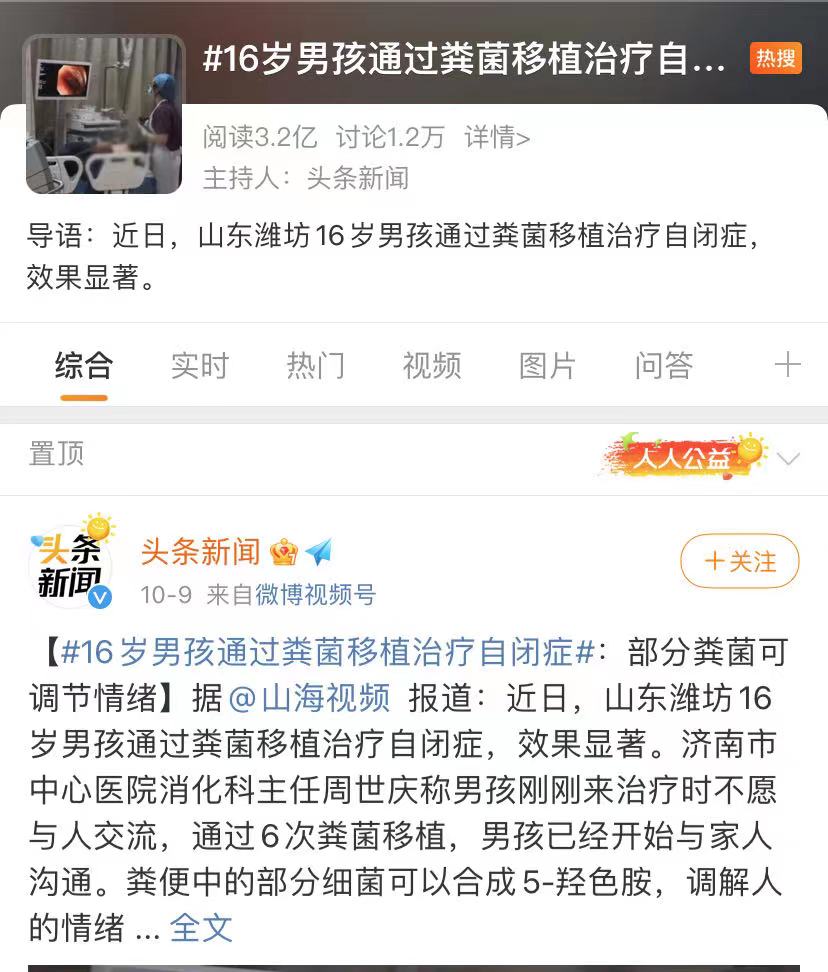The Paper's reporter Chen Sisi

"16-year-old boy to do fecal bacteria transplantation treatment of autism" on Weibo hot search, causing widespread discussion. Screenshot of Weibo
Recently, a report on "16-year-old boy doing fecal bacteria transplantation to treat autism" was on Weibo hot search, causing widespread discussion.
According to this report, recently, a 16-year-old boy in Weifang, Shandong Province, treated autism through fecal bacteria transplantation, and the effect was remarkable. Zhou Shiqing, director of the gastroenterology department of Jinan Central Hospital, said that the boy was reluctant to communicate with people when he first came to treatment, and through 6 fecal bacteria transplants, the boy had begun to communicate with his family.
Some netizens praised the magic of medical technology, but many people also raised questions such as "feces can also cure diseases" and "whether every autistic patient can be treated in this way".
On the evening of October 13, the surging news reporter interviewed Zhang Ting, director of the Gastroenterology Department of Shanghai Children's Hospital, and introduced the treatment technology of "bacterial and fecal transplantation".
"This treatment is still in the clinical research stage and needs to be validated by a large number of population data." Zhang Ting said that fecal bacteria transplantation refers to the transplantation of intestinal flora, the feces in the healthy human body are treated by scientific methods, transplanted into the body of people in need, and it is expected to replace the original unfavorable bacteria in the body with beneficial bacteria, rebuild the new intestinal microecological balance, and realize the treatment of intestinal and extraintestinal diseases. From a scientific point of view, fecal bacteria transplant the flora in the feces, not the feces themselves, and the statement that "feces can cure diseases" is not scientific.
"In the beginning, fecal bacteria transplantation technology was applied to digestive diseases, but later doctors studied and highly suspected that the chemicals produced by the gut microbiota affect brain function, so they began to expand the technology into the field of nerves, including research on autism." Zhang Ting said.
Zhang Ting further pointed out that studies at home and abroad have confirmed that there are significant differences between the intestinal flora of children with autism and the microbiota of normal children. Further studies of the gut-brain axis in recent years have shown that gut microbes may affect brain function by altering levels of neurotransmitters (i.e., chemicals that help transmit biological signals from one nerve cell to another) by altering the levels of neurotransmitters that communicate with the brain signals.
Fecal capsules prepared by Shanghai Children's Hospital Courtesy of the interviewee
On August 30 this year, the Shanghai Municipal Health Commission also issued the "Shanghai Microbiota Transplantation Technology Management Specification (2021 Edition)". The document notes that among the diseases treated with fecal bacteria, these include diseases of the mental system: autism, mood disorders, ADHD, tics, etc.
"But it must be noted that not all people with autism can be treated in this way." Zhang Ting said that as of now, Shanghai Children's Hospital has implemented 4 cases of fecal bacteria transplantation for autism, "the treatment of these children meets two conditions, one is that their families have the willingness to participate in this clinical study, the children themselves must also be evaluated by experts, and the other is that these children have different degrees of gastrointestinal symptoms, about 50% of children with autism have various gastrointestinal symptoms, including diarrhea, bloating, constipation or picky eating." Parents often describe a link between these gastrointestinal symptoms becoming apparent, as well as the child's core neurological symptoms. ”
Zhang Ting further said that the above 4 cases of autism children, accompanied by gastrointestinal symptoms, at present they through oral fecal capsules to complete this treatment, different from the preparation of conventional fecal bacteria suspension, fecal capsules need to be stirred, filtered, mixed solvent, centrifuged, concentrated and other steps to obtain concentrated fecal bacteria, in the biosafety cabinet after double packaging, placed in minus 80 ° C preservation, and then made into capsules.
At Shanghai Children's Hospital, four children with autism with gastrointestinal symptoms are currently trying to be treated with fecal bacteria transplantation, which is done by oral fecal capsules. Courtesy of respondents
"These 4 children with autism will also give them dietary guidance while taking oral capsules, and from the current treatment results of up to 3-4 months, their digestive tract symptoms have been significantly alleviated, and the core symptoms of autism have also improved." Zhang Ting explained that these core symptoms are reflected in a significant increase in oral and eye contact, as well as an increase in the cooperation of medical staff treatment.
However, Zhang Ting also stressed that from the current progress of clinical research at home and abroad, although it has been confirmed that fecal bacteria transplantation can partially improve the symptoms of autism, this treatment method is not a radical cure for autism, as for how long the efficacy can last, whether there are other better clinical treatment methods, follow-up still needs to be further clinical data accumulation and research.
Editor-in-charge: Zheng Hao